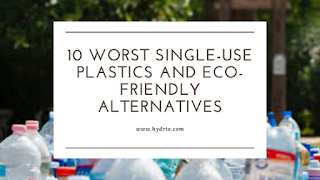10 worst single-use plastics and eco-friendly alternatives

So what’s the deal with single-use plastics ? Around 40% of plastics consumed are single-use. While convenient, they’re discarded after just one use. The amount of time, energy and effort that goes into producing, exporting and importing these products just doesn’t add up – especially if they’re made to last forever. Where do single-use plastics go once we’ve used them? Shockingly, only 12% of plastics used in Australia ends up recycled. For years, we’ve been sending our plastic waste overseas to be processed, but now countries like China have refused to accept 99% of our rubbish. These days, our recyclable waste often ends up stockpiled in landfill, littered by the sides of roads, in our parks, nature and oceans.Something needs to change. Here are the 10 worst single-use plastics and some eco-friendly alternatives you can swap them for! 1. Plastic Straws In Australia, 2.47 billion plastic straws end up in landfill. They’re lightwei...
